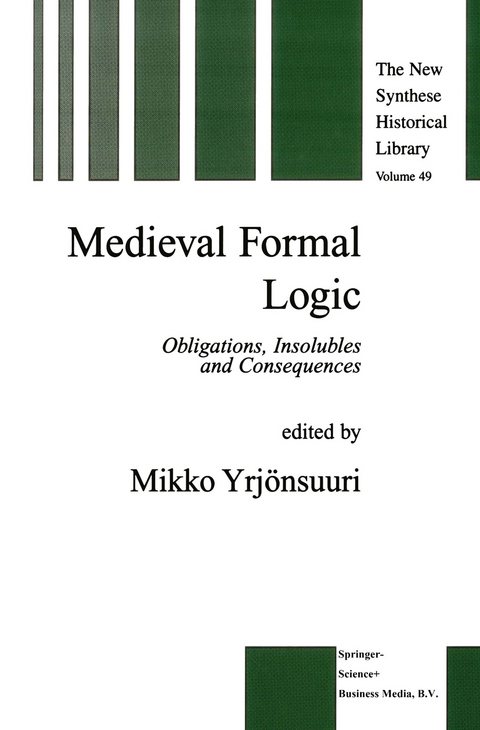
Medieval Formal Logic
Obligations, Insolubles and Consequences
Seiten
2000
|
2001 ed.
Kluwer Academic Publishers (Verlag)
9780792366744 (ISBN)
Kluwer Academic Publishers (Verlag)
9780792366744 (ISBN)
Central topics in medieval logic are here treated in a way that is congenial to the modern reader, without compromising historical reliability. There is also a systematic account of how medieval authors described the logical content of an inference, and how they thought that the validity of an inference could be guaranteed.
Central topics in medieval logic are here treated in a way that is congenial to the modern reader, without compromising historical reliability. The achievements of medieval logic are made available to a wider philosophical public then the medievalists themselves. The three genres of logica moderna arising in a later Middle Ages are covered: obligations, insolubles and consequences - the first time these have been treated in such a unified way. The articles on obligations look at the role of logical consistence in medieval disputation techniques. Those on insolubles concentrate on medieval solutions to the Liar Paradox. There is also a systematic account of how medieval authors described the logical content of an inference, and how they thought that the validity of an inference could be guaranteed.
Central topics in medieval logic are here treated in a way that is congenial to the modern reader, without compromising historical reliability. The achievements of medieval logic are made available to a wider philosophical public then the medievalists themselves. The three genres of logica moderna arising in a later Middle Ages are covered: obligations, insolubles and consequences - the first time these have been treated in such a unified way. The articles on obligations look at the role of logical consistence in medieval disputation techniques. Those on insolubles concentrate on medieval solutions to the Liar Paradox. There is also a systematic account of how medieval authors described the logical content of an inference, and how they thought that the validity of an inference could be guaranteed.
I Obligations and Insolubles.- Duties, Rules and Interpretations in Obligational Disputations.- Disputation and Change of Belief—Burley’s Theory of Obligationes as a Theory of Belief Revision.- Obligations and Liars.- The Relations between Insolubles and Obligations in Medieval Disputations.- II Consequences.- Consequence as Inference: Mediaeval Proof Theory 1300–1350.- Consequence and Rules of Consequence in the Post-Ockham Period.- Self-reference and Validity Revisited.- III Translations.- The Emmeran Treatise on False Positio.- The Emmeran Treatise on Impossible Positio.- Questions on Aristotle’s Prior Analytics Opposite of the Consequent?.- Index of Names.
| Erscheint lt. Verlag | 31.12.2000 |
|---|---|
| Reihe/Serie | The New Synthese Historical Library ; 49 |
| Zusatzinfo | XII, 242 p. |
| Sprache | englisch |
| Maße | 155 x 235 mm |
| Themenwelt | Geisteswissenschaften ► Philosophie ► Allgemeines / Lexika |
| Geisteswissenschaften ► Philosophie ► Logik | |
| Geisteswissenschaften ► Philosophie ► Philosophie des Mittelalters | |
| Geisteswissenschaften ► Philosophie ► Sprachphilosophie | |
| ISBN-13 | 9780792366744 / 9780792366744 |
| Zustand | Neuware |
| Informationen gemäß Produktsicherheitsverordnung (GPSR) | |
| Haben Sie eine Frage zum Produkt? |
Mehr entdecken
aus dem Bereich
aus dem Bereich
die letzten Jahre der Philosophie und der Beginn einer neuen …
Buch | Hardcover (2024)
Klett-Cotta (Verlag)
CHF 39,20


